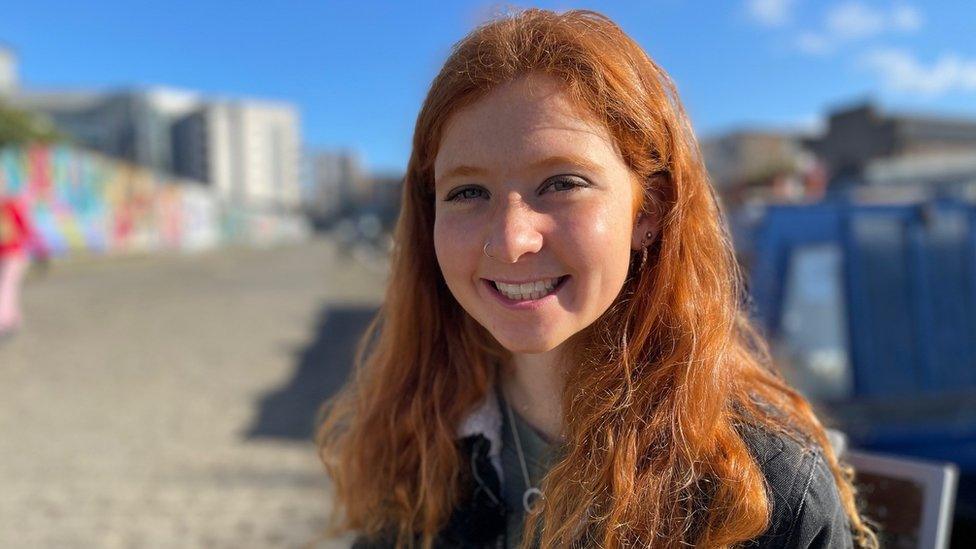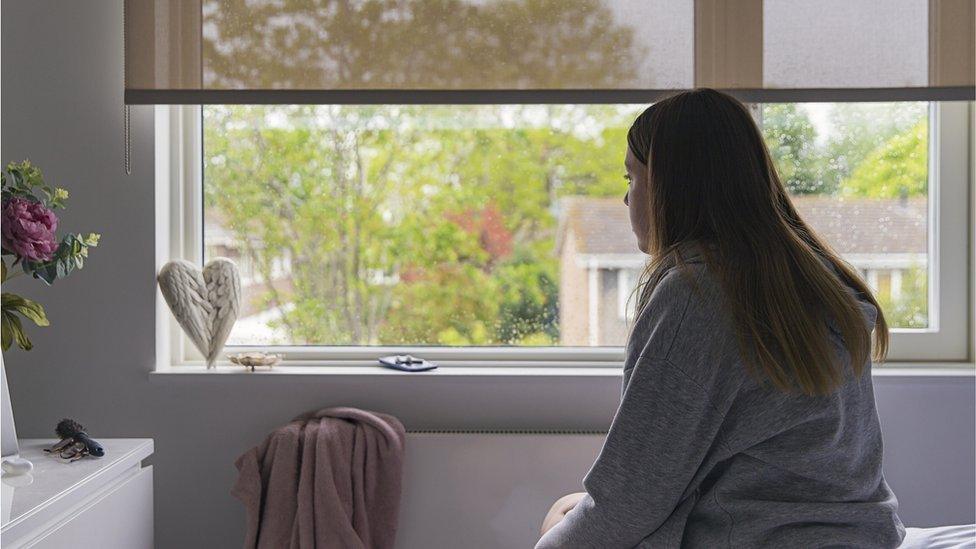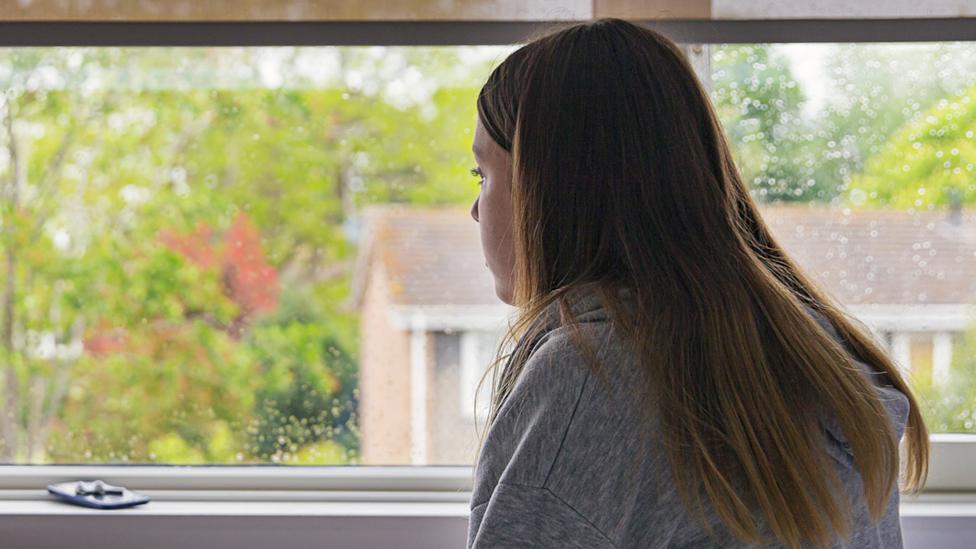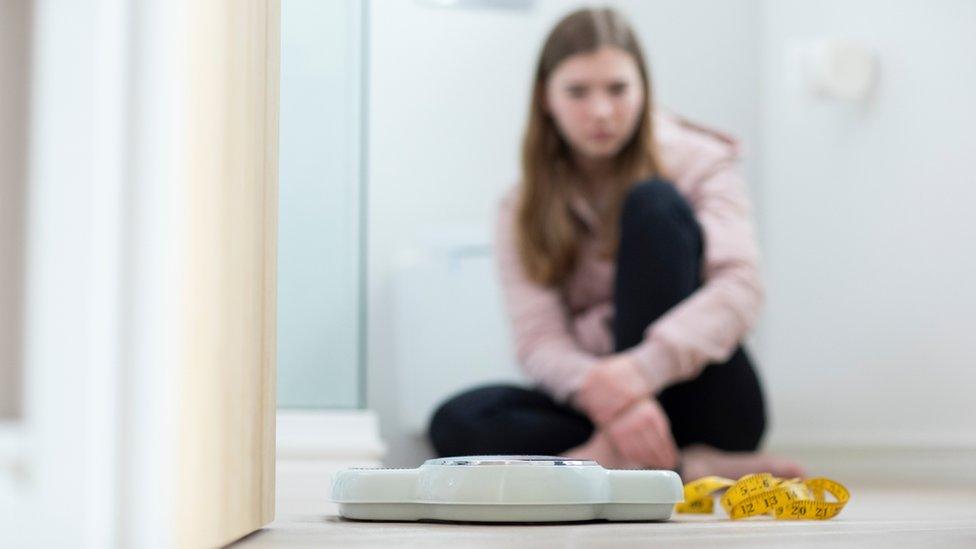'Voices in my head said I wasn't working hard enough'
- Published

Student Cara Neary said her eating disorder was like being bullied without any means of escaping your tormentor
Cara Neary was 14 when she became increasingly concerned with following what she called a "healthy lifestyle".
She became obsessed with exercising more and eating less, and within a year it had taken over her life.
By the age of 16, she had been diagnosed with anorexia, external - an eating disorder and mental health condition where people limit how much they eat and, or, exercise too much.
And as her condition deteriorated she said she started to hear voices.
Cara told BBC Scotland: "Eating out especially and eating around people was making me really uncomfortable and scared.
"When I was 17 it really spiralled and that was my crisis point."
She began to lie to her family, found ways to hide food and secretive ways to burn calories.
'It's like being bullied'
Cara, who is now 20, said: "Everyone was telling me, 'you have an issue' and I couldn't see it.
"And all that time I'm hearing these horrible voices in my head telling me 'you're not working hard enough'.
"It's like being bullied but you can't go home and get out of it.
"You can't turn off your Facebook or your Twitter, it's there and no-one else can see it, no-one else can hear the voices. It's just you."
At her lowest ebb Cara sometimes felt there was no escape and at times wondered if she would die.
She said it was the hardest experience of her life, but she was lucky and able to access specialist help.
At first she learned to eat small, regular meals each day with no more than twenty minutes walking.
And she credited her family and school for stepping in to help her, and she is now three years into her recovery.
Cara has now moved from child to adult services. She was referred for cognitive behavioural therapy in Edinburgh and says it has been a huge help.
"Now I feel great, I am very happy, I am very healthy.
"I do struggle sometimes and I have to fight horrible thoughts and there's a lot I of stuff I've got to work on and deal with, but I never worry that I'm going to die because I'm not eating enough.
"I can't really remember what that felt like now, I find it hard to remember that that was what I was like."

Cara is one of rising numbers of young people being diagnosed with an eating disorder.
Referrals to specialist services have increased significantly.
The most recent government data shows the number of patients admitted with an eating disorder has increased from 434 in 2013 to 556 in 2018 - a rise of 28% in the five-year period.
Full data for the course of the pandemic is not currently available but Scotland's two regional adolescent psychiatric units have reported a combined 161% increase in eating disorder admissions from 26 in 2019 to 68 in 2020.
Last month a new clinical guideline was published by Healthcare Improvement Scotland to help healthcare professionals working with those affected by eating disorders.
And in October the Scottish government set up an implementation group to improve support for patients, families and carers affected by eating disorders.
A total of £5m has also been allocated to NHS boards to respond to an increase in referrals due to the Covid crisis, with the eating disorder charity Beat, external also awarded more than £400,000.
Doctors say things are improving but that there are still significant gaps in provision, with more data on the types and underlying causes of eating disorders required.
'Completely overlooked'
Dr Jane Morris, vice-chair of the Royal College of Psychiatrists in Scotland, warned that since the pandemic there had been "a huge increase in the demand and need for eating disorder services" across the country.
She continued: "Whilst we have many centres of excellence, unfortunately there are whole geographic areas of Scotland that are not properly served and whole areas of the population who feel either that they are completely overlooked or the services don't cater for their particular type of eating disorders."
The Scottish government said early feedback indicated boards had used the additional funding to ensure their staff had access to the right training, expand clinician time and for recruitment.
A spokeswoman added NHS boards have already agreed to allocate £40m to deliver improved Child and Adolescent Mental Health Services, which includes clearing waiting list backlogs.
Related topics
- Published22 July 2021

- Published16 June 2021

- Published3 September 2020
